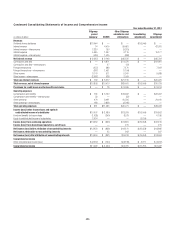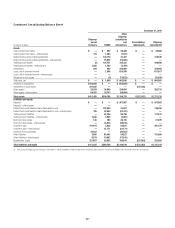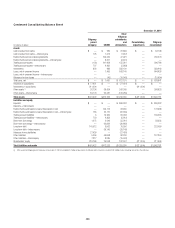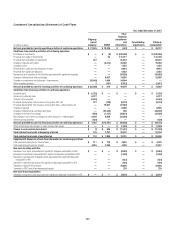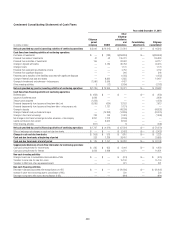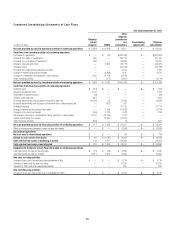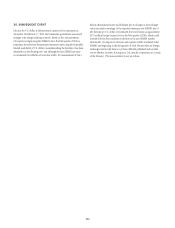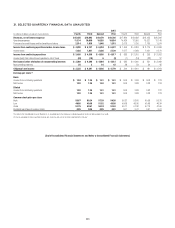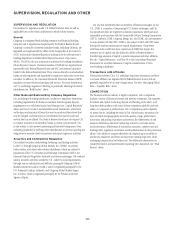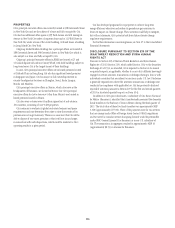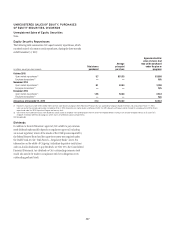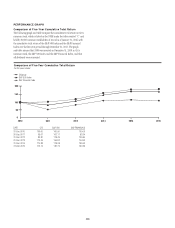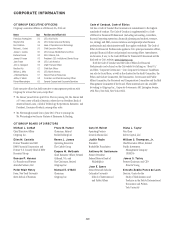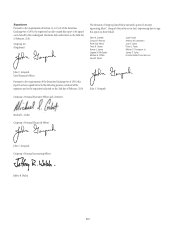Citibank 2015 Annual Report Download - page 323
Download and view the complete annual report
Please find page 323 of the 2015 Citibank annual report below. You can navigate through the pages in the report by either clicking on the pages listed below, or by using the keyword search tool below to find specific information within the annual report.305
SUPERVISION, REGULATION AND OTHER
SUPERVISION AND REGULATION
Citi is subject to regulation under U.S. federal and state laws, as well as
applicable laws in the other jurisdictions in which it does business.
General
Citigroup is a registered bank holding company and financial holding
company and is regulated and supervised by the Federal Reserve Board.
Citigroup’s nationally chartered subsidiary banks, including Citibank, are
regulated and supervised by the Office of the Comptroller of the Currency
(OCC) and its state-chartered depository institution by the relevant state’s
banking department and the Federal Deposit Insurance Corporation
(FDIC). The FDIC also has examination authority for banking subsidiaries
whose deposits it insures. Overseas branches of Citibank are regulated and
supervised by the Federal Reserve Board and OCC and overseas subsidiary
banks by the Federal Reserve Board. These overseas branches and subsidiary
banks are also regulated and supervised by regulatory authorities in the host
countries. In addition, the Consumer Financial Protection Bureau (CFPB)
regulates consumer financial products and services. For more information
on U.S. and foreign regulation affecting or potentially affecting Citi and its
subsidiaries, see “Risk Factors” above.
Other Bank and Bank Holding Company Regulation
Citi, including its banking subsidiaries, is subject to regulatory limitations,
including requirements for banks to maintain reserves against deposits,
requirements as to risk-based capital and leverage (see “Capital Resources”
above and Note 19 to the Consolidated Financial Statements), restrictions
on the types and amounts of loans that may be made and the interest that
may be charged, and limitations on investments that can be made and
services that can be offered. The Federal Reserve Board may also expect Citi
to commit resources to its subsidiary banks in certain circumstances. Citi
is also subject to anti-money laundering and financial transparency laws,
including standards for verifying client identification at account opening and
obligations to monitor client transactions and report suspicious activities.
Securities and Commodities Regulation
Citi conducts securities underwriting, brokerage and dealing activities
in the U.S. through Citigroup Global Markets Inc. (CGMI), its primary
broker-dealer, and other broker-dealer subsidiaries, which are subject to
regulations of the U.S. Securities and Exchange Commission (SEC), the
Financial Industry Regulatory Authority and certain exchanges. Citi conducts
similar securities activities outside the U.S., subject to local requirements,
through various subsidiaries and affiliates, principally Citigroup Global
Markets Limited in London (CGML), which is regulated principally by the
U.K. Financial Conduct Authority, and Citigroup Global Markets Japan
Inc. in Tokyo, which is regulated principally by the Financial Services
Agency of Japan.
Citi also has subsidiaries that are members of futures exchanges. In the
U.S., CGMI is a member of the principal U.S. futures exchanges, and Citi
has subsidiaries that are registered as futures commission merchants and
commodity pool operators with the Commodity Futures Trading Commission
(CFTC). Citibank, CGMI, Citigroup Energy Inc. and CGML, also are registered
as swap dealers with the CFTC. CGMI is also subject to SEC and CFTC rules
that specify uniform minimum net capital requirements. Compliance
with these rules could limit those operations of CGMI that require the
intensive use of capital and also limits the ability of broker-dealers to
transfer large amounts of capital to parent companies and other affiliates.
See also “Capital Resources” and Note 19 to the Consolidated Financial
Statements for a further discussion of capital considerations of Citi’s
non-banking subsidiaries.
Transactions with Affiliates
Transactions between Citi’s U.S. subsidiary depository institutions and their
non-bank affiliates are regulated by the Federal Reserve Board, and are
generally required to be on arm’s-length terms. See also “Managing Global
Risk—Liquidity Risk” above.
COMPETITION
The financial services industry is highly competitive. Citi’s competitors
include a variety of financial services and advisory companies. Citi competes
for clients and capital (including deposits and funding in the short- and
long-term debt markets) with some of these competitors globally and with
others on a regional or product basis. Citi’s competitive position depends
on many factors, including the value of Citi’s brand name, reputation, the
types of clients and geographies served, the quality, range, performance,
innovation and pricing of products and services, the effectiveness of and
access to distribution channels, technology advances, customer service
and convenience, effectiveness of transaction execution, interest rates and
lending limits, regulatory constraints and the effectiveness of sales promotion
efforts. Citi’s ability to compete effectively also depends upon its ability to
attract new employees and retain and motivate existing employees, while
managing compensation and other costs. For additional information on
competitive factors and uncertainties impacting Citi’s businesses, see “Risk
Factors” above.



